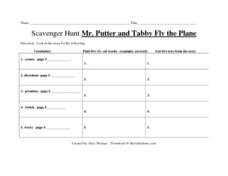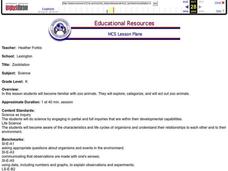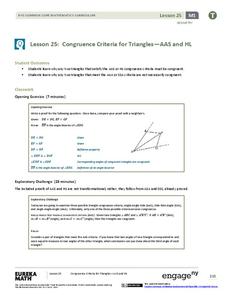Curated OER
Prepositions
In this grammar activity, students read a selection about prepositions and complete the three column graphic organizer using prepositions. Students write 5 sentences using prepositions.
Curated OER
Scavenger Hunt: Hedgehog Bakes a Cake
In this Hedgehog Bakes a Cake scavenger hunt learning exercise, students locate 6 vocabulary words, 4 characters, and 5 special words in the story and record their findings on the graphic organizer.
Curated OER
Scavenger Hunt: Mr. Putter and Tabby Fly the Plane
In this Mr. Putter and Tabby Fly the Plane scavenger hunt worksheet, students locate 5 vocabulary words, 5 toys from the story, and 5 special words in the story and record their findings on the graphic organizer.
Curated OER
Butterflies A-Flutter
In this butterfly worksheet, students read about butterflies, then complete a graphic organizer, drawing pictures of 2 different butterflies, using a table of "stay-safe" butterfly tricks to help complete the chart.
Curated OER
IB History of the Americas
In this Mexican American War worksheet, students read "We Take Nothing by Conquest, Thank God," and then complete the graphic organizer and respond to 2 short answer questions about the article. The article is not included.
Curated OER
Mood and Tone
In this literary elements worksheet, students fill in the graphic organizer by writing down the mood and tone of the writing piece. There are three boxes for students to fill in details about the mood, as well as the tone.
Curated OER
Get Out of the Box
Third graders think outside the box with this lesson in organization through webbing. After a lecture/demo, 3rd graders utilize a worksheet imbedded in this plan which guides them through creating a writing web.
New Class Museum
Lesson: Emory Douglas: Decoding Images and Vocabulary Activity
To better understand the work of Black Panther logo artist Emory Douglas, learners define literary devices. They define a series of words such as metaphor, simile, and assonance, then place an example of that device found in Emory...
Curated OER
All in the Family: Calculating Cousins
Students view pictures of distant "cousins" to humans. They place them in order by their distance from humans. Students receive a packet of six pages featuring graphics and a cousins summary page. They work in groups to complete 5 cousin...
Curated OER
Zoobilation
Youngsters become familiar with zoo animals. They sort them into categories, and choose an animal to act out. Two zoo centers are created in the classroom that have examples of the animals for the pupils to play with. Then, they choose...
Howard Hughes Medical Institute
RNA Diversity
Messenger RNA, transfer RNA, and ribozymes ... the many faces of RNA. The structure of RNA makes it much more versatile than the very similar DNA. Learners view a slideshow presentation to learn all about the different forms and...
Curated OER
Energy Transformation Worksheet
Upper elementary or middle school scientists determine what types of energy are involved in six different pictures. Then they produce examples of three different energy transformations. This worksheet has colorful graphics and is neatly...
Curated OER
The Metamorphosis: List-Group-Label Strategy
Franz Kafka's The Metamorphosis is one of the most prominent and influential books to come out of the existential movement. Host a group discussion in which learners list different characteristics of existent art, group...
Willow Tree
Angle Measurement
What do you create when you rotate a ray? An angle! Teach all the angle basics including naming, measuring, supplements, and complements.
EngageNY
Congruence Criteria for Triangles—AAS and HL
How can you prove it? Guide classes through an exploration of two possible triangle congruence criteria: AAS and HL. Learners connect this criteria to those previous learned and also explore criteria that does not work. The lesson...
EngageNY
Congruence Criteria for Triangles—ASA and SSS
How do you know if a pair of triangles are congruent? Use the lesson to help class members become comfortable identifying the congruence criteria. They begin with an exploration of ASA and SSS criteria through transformations and...
EngageNY
Translations
Learn through constructions! Learners examine a translation using constructions and define the translation using a vector. Pupils then construct parallel lines to determine the location of a translated image and use the vector as a guide.
K20 LEARN
Transformers Part 1 - Absolute Value and Quadratic Functions: Function Transformations
Transform your instruction with an exploratory lesson! Young scholars manipulate absolute values and quadratic functions to look for transformation patterns. They use the patterns to write general rules of transformations.
Curated OER
Developing an Outline
A lot of writers don't like creating an outline before writing the first draft of their paper. Introduce them to what an effective and organized outline looks like with this presentation. Designed for higher education, you could easily...
Curated OER
Paradise Lost: Problem Situation
Let your class voice their opinions with a group debate activity. Before reading John Milton's Paradise Lost, they work in small groups in assigned roles to form a position about authority and rebellion, comparing a...
Bantam Books
The Martian Chronicles: K-W-H-L Activity
Prepare your class for a unit on Ray Bradbury's The Martian Chronicles with an activity that works for pre-reading, during reading, and post-reading. Learners fill out a K-W-H-L chart to reflect on what they already know, what...
EngageNY
Grade 9 ELA Module 1, Unit 2, Lesson 4
As a mid-unit assessment, class members demonstrate their understanding of the concepts covered so far by crafting a formal, multi-paragraph essay in which they analyze how Rainer Maria Rilke's word choices develop the meaning and tone...
EngageNY
How Do Dilations Map Lines, Rays, and Circles?
Applying a learned technique to a new type of problem is an important skill in mathematics. The lesson asks scholars to apply their understanding to analyze dilations of different figures. They make conjectures and conclusions to...
EngageNY
Using Trigonometry to Find Side Lengths of an Acute Triangle
Not all triangles are right! Pupils learn to tackle non-right triangles using the Law of Sines and Law of Cosines. After using the two laws, they then apply them to word problems.























